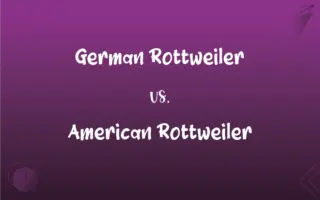Association vs. Correlation: What's the Difference?
Edited by Harlon Moss || By Janet White || Published on December 19, 2023
Association refers to any relationship between variables, while correlation quantitatively measures the linear relationship between two variables.

Key Differences
Association in statistics implies a general relationship or linkage between two or more variables. In contrast, correlation specifically refers to a statistical measure that expresses the extent to which two variables change together.
An association does not necessarily imply a cause-and-effect relationship, merely that variables are related in some way. Correlation, however, quantifies the degree to which one variable moves in relation to another.
Associations are often identified through patterns or trends in data but are not quantified. Correlation is typically measured using a correlation coefficient, such as Pearson's or Spearman's rho, which indicates the strength and direction of the linear relationship.
Detecting an association is often the first step in data analysis, which may lead to further investigation of correlations. Correlation analysis is used to test specific hypotheses about the nature of relationships between variables.
Association alone does not imply causation; two associated variables may not have a direct cause-and-effect link. Correlation also does not imply causation but provides a more specific framework for understanding how variables are related.
ADVERTISEMENT
Comparison Chart
Definition
General linkage or relationship
Quantitative measure of linear relationship
Nature of Relationship
Non-specific, varied types of linkages
Specifically linear relationships
Measurement
Qualitative or observational
Quantitative, with correlation coefficients
Interpretation
Broad, less precise
Precise, indicating strength and direction
Implication of Causality
Does not imply causation
Does not imply causation
ADVERTISEMENT
Association and Correlation Definitions
Association
The act of associating with others.
Her association with influential people benefited her career.
Correlation
A statistical measure that indicates the extent to which two or more variables fluctuate together.
A strong correlation was found between hours studied and exam scores.
Association
A connection or relation between things or ideas.
The association between diet and health is well-known.
Correlation
In statistics, the degree to which two variables move in relation to each other.
The correlation between economic growth and environmental degradation was analyzed.
Association
A statistical relationship between two or more variables.
Researchers found an association between smoking and lung cancer.
Correlation
A mutual relationship or connection between two or more things.
There is a correlation between a healthy diet and reduced disease risk.
Association
A group of people organized for a joint purpose.
She joined the association of professional photographers.
Correlation
A connection where one thing affects or depends on another.
The study showed a correlation between sleep patterns and learning efficiency.
Association
The mental connection between ideas or things.
In his mind, there was a strong association between rain and sadness.
Correlation
The interdependence of variable quantities.
In finance, the correlation between risk and return is a fundamental concept.
Association
The act of associating or being connected with
My parents disapproved of my association with my friends from across town.
Correlation
A relationship or connection between two things based on co-occurrence or pattern of change
A correlation between drug abuse and crime.
FAQs
Can association imply causation?
No, association itself does not imply causation.
What is association in statistics?
It's a relationship or linkage between variables, not necessarily causal.
What does correlation measure?
The strength and direction of a linear relationship between variables.
Is a higher correlation coefficient always better?
Not necessarily, it depends on the context of the data.
Can two variables be associated but not correlated?
Yes, if their relationship is not linear.
What types of correlation are there?
Positive, negative, and zero correlation.
How is association identified?
Through patterns or trends observed in data.
How do researchers test for association?
Through various statistical methods and analysis of patterns.
Is correlation always linear?
Correlation specifically measures linear relationships.
What’s an example of non-linear association?
A U-shaped relationship between two variables.
What is a correlation coefficient?
A numerical value expressing the degree of correlation.
Are all forms of association measurable?
Not all, some are observed qualitatively.
Can correlation be misleading?
Yes, especially if used to infer causation.
How is association used in data analysis?
As a preliminary step to identify relationships for further study.
What is Pearson’s correlation coefficient?
A measure of the linear correlation between two variables.
Does correlation indicate which variable affects the other?
No, it doesn’t specify cause-and-effect.
What is a spurious correlation?
A correlation that appears causal but is due to a third variable or chance.
What’s the difference between correlation and regression?
Correlation measures relationship strength, regression predicts one variable from another.
Can correlation be zero?
Yes, if there is no linear relationship between variables.
Can association exist without correlation?
Yes, especially in non-linear relationships.
About Author
Written by
Janet WhiteJanet White has been an esteemed writer and blogger for Difference Wiki. Holding a Master's degree in Science and Medical Journalism from the prestigious Boston University, she has consistently demonstrated her expertise and passion for her field. When she's not immersed in her work, Janet relishes her time exercising, delving into a good book, and cherishing moments with friends and family.
Edited by
Harlon MossHarlon is a seasoned quality moderator and accomplished content writer for Difference Wiki. An alumnus of the prestigious University of California, he earned his degree in Computer Science. Leveraging his academic background, Harlon brings a meticulous and informed perspective to his work, ensuring content accuracy and excellence.






































































